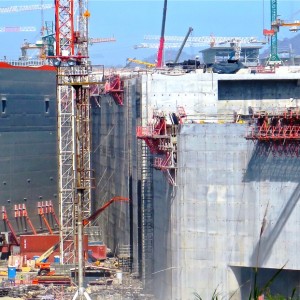The Stream, January 27: Tropical Andes Glaciers Declining At Fastest Rate in 300 Years
The Global Rundown |
Glaciers in the tropical Andes have declined as much as 50 percent in the last 30 years, and China’s coal production dropped for the first time this century. The developing world is producing so much plastic that it could eventually outweigh all of the fish in the ocean, conservationists warn, while scientists have found that the toxicity of storm runoff is greatly reduced by soil filters. Floods in Malawi are expected to cut the country’s projected economic growth this year, a bank in Brazil has raised millions for water treatment and renewable energy projects, and new findings at an archaeological site in Belize revealed an ancient Maya water temple.
“We [could] end up with an ocean that has an amount of plastic that’s in the same order of magnitude as the amount of fish, in terms of tonnes.”–Andreas Merkl, CEO of environmental group Ocean Conservancy, on the growing amount of plastic making its way into the world’s oceans as a global middle class emerges. (Guardian)
By The Numbers |
2 percent Decline last year in China’s coal production, which requires huge quantities of fresh water. It is the first time production has dropped this century, according to state media. Business Green
5.8 percent Projected economic growth in Malawi in 2015, which the country is now expected to miss due to its costly flood disaster. Bloomberg
$408 million Amount raised for water treatment and renewable energy projects by Brazilian bank Itau Unibanco. Private banks are expected to play a larger role in Brazil’s development as the government reduces its spending.
Science, Studies, And Reports |
Tropical glaciers in South America’s Andes mountains have declined 35 to 50 percent in size in the past three decades, the fastest rate of decrease in at least 300 years, according to glaciologists. The glaciers are critical for supplying water for drinking, agriculture, and energy production in countries such as Peru. Guardian
Storm runoff from a Seattle highway was no longer lethal to fish after passing through a simple dirt filter, scientists at Washington State University found. The study illustrated that allowing water to move through soil, even without plant cover, could clean up water systems in developed areas. The New York Times
On The Radar |
Archaeological findings at the Cara Blanca pools in Belize revealed a water temple built by the ancient Maya civilization. There is also evidence that people began increasing their offerings and prayers for rain at the site during the droughts that played a role in the civilization’s collapse. National Geographic
A news correspondent for Circle of Blue based out of Hawaii. She writes The Stream, Circle of Blue’s daily digest of international water news trends. Her interests include food security, ecology and the Great Lakes.
Contact Codi Kozacek






Leave a Reply
Want to join the discussion?Feel free to contribute!